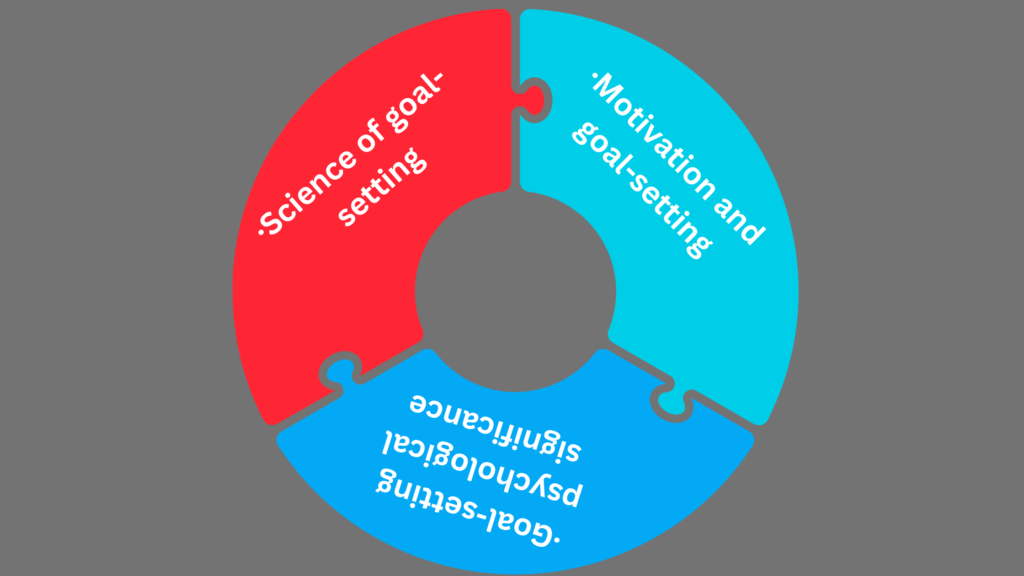
- Science of goal-setting
- Goal-setting psychological significance
- Motivation and goal-setting
- Effective goal-setting methods
- Overcoming common goal-setting challenges
Introduction
Goal setting is essential to personal and professional growth. It inspires, motivates, and guides people to success. Understanding goal-setting psychology can help us use it more successfully. This article discusses goal-setting science, motivation and behavior, and how to create long-term objectives.
Science of goal-setting
Goal-setting is founded in psychology, primarily cognitive and behavioral sciences. Gave Goal-setting According to Edwin Locke and Gary Latham, precise and demanding goals improve performance more than vague or basic goals. Their research implies that goal setting motivates people through these mechanisms:
Description: Specific goals reduce ambiguity, making them easier to achieve.
Goals that are challenging yet feasible push people to achieve better.
Determination: Goal-oriented people are more inclined to persevere.
Feedback: Regular feedback helps people track progress and adapt efforts.
Work complexity: Break goals into simple chunks to avoid overwhelm and stay motivated.
Psychological advantages of goal setting
Goal-setting psychological significance
1. Motivate
Set goals and construct a mental roadmap to achieve them. This blueprint motivates and keeps them motivated. Research demonstrates that goal-oriented persons perform better.
Self-esteem and self-efficacy increase when goals are met. Every tiny win boosts confidence and inspires more significant goals.
3. Stress and anxiety reduction
Clear goals eliminate ambiguity and anxiety by systematically addressing difficulties. Knowing what to do minimizes stress and improves focus.
4. Better attention and decision-making
Goals filter tasks and help people prioritize them. This concentrated approach avoids distractions and improves decision-making.
Motivation and goal-setting
Psychologists say two forms of motivation affect goal achievement:
Intrinsic motivation is doing something for its own sake rather than for rewards. Setting objectives matching beliefs and interests leads to better fulfillment and long-term commitment.
2. External stimuli
Money, recognition, and job growth motivate extrinsically. Extrinsic rewards are great, but intrinsic motivation sustains achievement.
Effective goal-setting methods
Use evidence-based goal-setting processes to optimize advantages. Some effective methods:
1. Use SMART
The SMART criteria ensure clear and achievable goals:
Specific: State your goal.
Measurable: Track progress using benchmarks.
Possible: Set attainable goals.
Related: Align goals with values and long-term objectives.
Deadline: Create urgency with a deadline.
2. Divide goals into stages
Breaking significant objectives into tiny, realistic stages makes them more achievable and motivates you.
3. Imagine success
Visualization is a significant psychological tool. Seeing oneself succeeding motivates and inspires you.
4. Adopt a growth mentality
Carol Dweck precise a growth mindset as the concept that effort and learning may improve intellect and talents. Growth mindsets foster resilience and help people perceive problems as learning opportunities.
5. Monitor progress and adapt
Reviewing progress regularly helps people adjust and stay on track. Achieving goals is also motivated by tracking successes.
6. Be responsible
Sharing objectives with a trustworthy friend, mentor, or coach boosts accountability. Accountability helps people stay engaged and achieve their goals.
Overcoming common goal-setting challenges
Goal setting has many benefits, but people typically struggle to achieve them. Here are frequent challenges and solutions:
1. Motivation deficit
Solution: Discover your objectives’ deeper meanings and make the process fun. Align goals with personal beliefs and imagine their beneficial influence on life.
2. Overcoming Failure Anxieties
Consider setbacks and opportunities to learn and grow by embracing a mentality focused on finding solutions. Accept that failures are part of growth and use them to improve.
3. Delay Solution
Establish deadlines, break things down into smaller chunks, and utilize productivity tools like the Commodore Technique. Use a routine to manage distractions and prioritize productive tasks.
4. Unclarity
Solution: Use SMART to reevaluate objectives to make them clear and actionable. Writing your goals and creating a step-by-step strategy will help you stay focused.
5. External distractions
Solution: Focus on time management and a distraction-free atmosphere. To reduce distractions, try time-blocking or scheduling focused work times.
The result
According to psychology, goals motivate, boost self-esteem, and improve well-being. Psychological concepts and goal-setting tactics may increase success and fulfillment. Goal setting helps people develop and thrive, whether personal or professional. Strategic planning, motivation, and perseverance will lead to long-term success and individual improvement.
